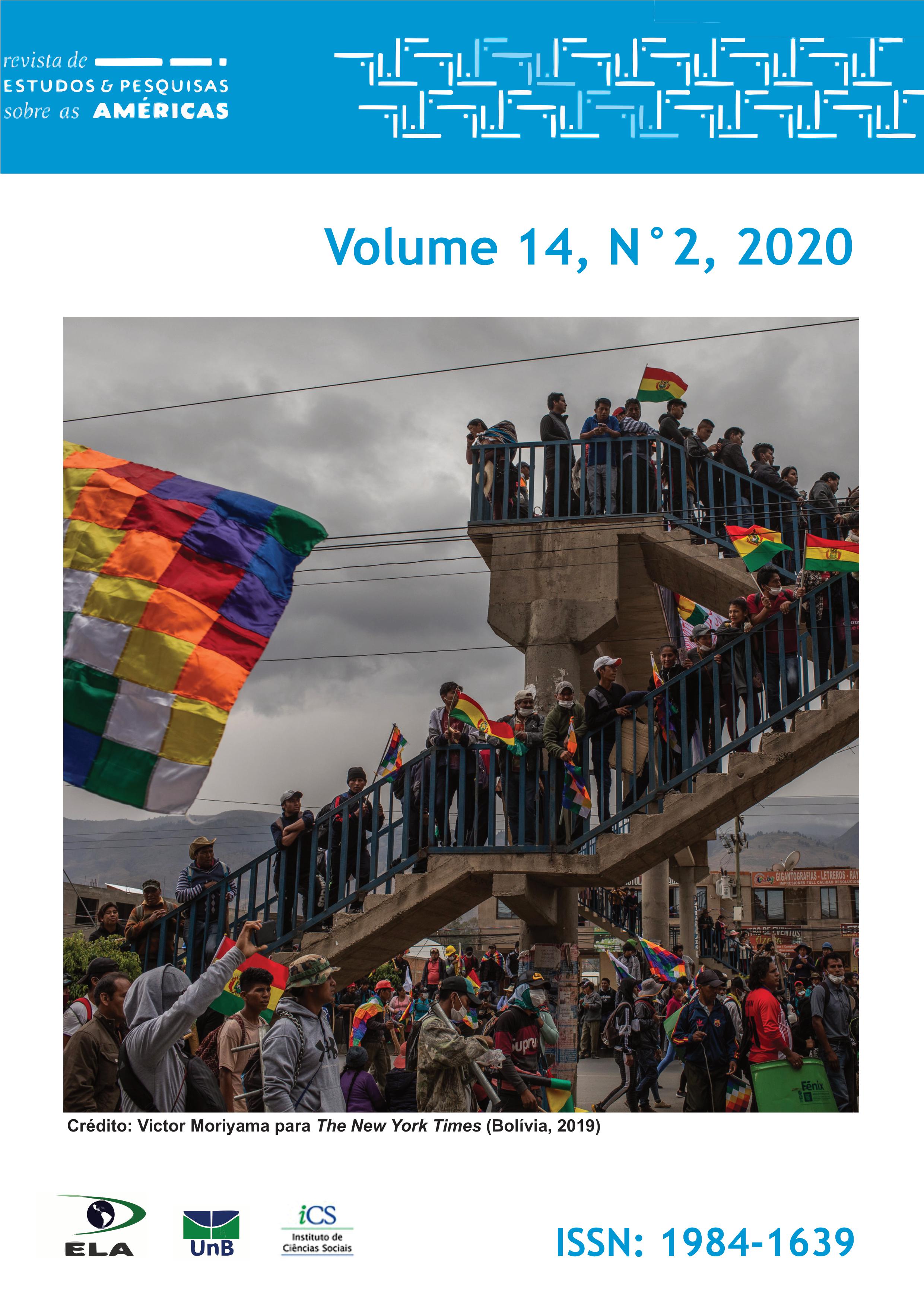Contradictions of Capitalism and Social Transformations in Latin America
DOI:
https://doi.org/10.21057/10.21057/repamv14n2.2020.31719Keywords:
Contradictions of Capitalism; Social Integration; Neoliberal Culture; Ideology; Contemporary Critical Theory; Jürgen Habermas; Wolfgang Streeck; Latin America.Abstract
Latin American societies today are crackling with the emergence of new forms of political radicalization which, far from challenging capitalism, seem more like channels for occluding their democratic boundaries. How can we understand this process in which there is a mysterious intertwining of neoliberalism and the darkest forces opposed to the fundamental principle of equal freedom for the members of a political community? In this paper we approach this problem by interpreting the social transformations that have taken place in the region since the last great economic crisis of capitalism. In order to do so, we examine some discussions of contemporary Critical Theory about these effects on the specific level of the forms of integration that structure our social world. In this sense, we are guided by a question that has accompanied Sociology since its beginnings, namely: how the infrastructure of the collective supports of the individual can be eroded by the historical transformations of the capitalist economic system. The article ends with an analytical approach to the role played in our present by recent reconfigurations of neoliberal culture for contemporary subjectivity.
Downloads
References
Amin, Samir, “The Return of Fascism in Contemporary Capitalism”, Monthly Review, vol. 66 (4), 2014.
Balibar, Étienne, Violencias, Identidades y Civilidad, Buenos Aires: Gedisa, 2005.
Beckert, Jens, “The great transformation of embeddedness”, en: C. Hann y K. Hart (Eds.) Market and Society: The Great Transformation Today, Nueva York: Cambridge University Press, 2009.
Boltanski, L. y Chiapello, Éve, Le nouvel esprit du capitalisme, París: Gallimard, 1999.
Butler, Judith, Notes Toward a Performative Theory of Assembly, Cambridge: Harvard University Press, 2015.
Brown, Wendy, Gordon, Peter y Pensky, Max, Authoritarianism. Three Inquiries in Critical Theory, Chicago y Londres: The University Chicago Press, 2019.
Brown, Wendy, In the Ruins of Neoliberalism, Nueva York: Columbia University Press, 2019.
Castro-Gómez, Santiago y Grosfoguel, Ramón (org.), El giro decolonial, Bogotá: Siglo de Hombre, 2007.
Cornejo Polar, Antonio, Escribir en el aire, Lima: CELACP ”“ Latinoamericana editores, 2003.
Davies, William, “The New Neoliberalism”, New Left Review, núm. 101, 2016.
Fraser, Nancy, The Old is Dying and the New Cannot Be Born, Nueva York: Verso, 2019.
Gramsci, Antonio, Cuadernos de la cárcel. Tomo 2, México D. F.: Ediciones Era, 1981.
Habermas, Jürgen, Theorie des kommunikativen Handels (II), Frankfurt: Suhrkamp, 1988.
Harvey, David, Breve historia del neoliberalismo, Madrid: Akal, 2007.
Honneth, Axel y Joas, Hans (Eds.), Communicative Action. Essays on Jürgen Habermas´s The Theory of Communicative Action, Cambridge: The MIT Press, 1991.
Horkheimer, Max y Adorno, Theodor, Dialektik der Afklärung, Berlin: De Gruyter, 2017.
Ipar, Ezequiel, “Neoliberalismo y neoautoritarismo”, Política y sociedad, vol. 55 (3), 2018.
Jameson, Friedric, Postmodernism, or, The Cultural Logic of Late Capitalism, Durham: Duke University Press, 1990.
Lockwood, David, “Social Integration and System Integration”, en: G. K. Zollschan y W. Hirsch (eds.) Social Change, Nueva York: John Willey & Sons, 1964.
Membe, Achille, Necropolítica, Madrid: Melusina, 2011.
Peck, Jamie, Constructions of Neoliberal Reason, Oxford: Oxford University Press, 2010.
Pérez Sáinz, Juan P., La historia de la desigualdad en América Latina, Buenos Aires: Siglo XXI, 2016.
Polanyi, Karl, The Great Transformation, Boston: Beacon Press, 2001.
Prestifilippo, Agustín L. y Wegelin, Lucía, “El neoliberalismo como trama ideológica en la Argentina reciente”, Utopía y praxis latinoamericana, núm. 74, 2016.
Prestifilippo. Agustín L. y Wegelin, Lucía, “La libertad precarizada. Nuevas formas sociales del padecimiento en el mundo del trabajo”, Argumentos. Revista de crítica social, núm. 21, 2019.
Quijano, Anibal, “Colonialidad del poder, eurocentrismo y América Latina”, en: Cuestiones y horizontes, Buenos Aires: Clacso, 2014.
Regatieri, Ricardo, P., Capitalismo sem peias. A crítica da dominaçã nos debates no Instituto de Pesquisa Social no início da década de 1940 e na elaboração da Dialética do Esclarecimento, São Paulo: Humanitas, 2019.
Traverso, Enzo, The New Faces of Fascism, Londres y Nueva York: Verso, 2019.
Stiglitz, Joseph E., El malestar en la globalización, Madrid: Taurus, 2002.
Streeck, Wolfgang, Re-Forming Capitalism, Nueva York: Oxford University Press, 2009.
Streeck, Wolfgang, Gekaufte Zeit, Frankfurt: Suhrkamp, 2013.
Streeck, Wolfgang, How Will Capitalism End?, Nueva York: Verso, 2016.
Streeck, Wolfgang, “The Return of the Repressed”, en: H. Geiselberger (ed.) The Great Regression, Cambridge: Polity, 2017.
Žižek, Slavoj, The Metastases of Enjoyment, Londres: Verso, 2006.
Downloads
Published
How to Cite
Issue
Section
License
Copyright (c) 2020 Agustín Lucas Prestifilippo

This work is licensed under a Creative Commons Attribution-NonCommercial 4.0 International License.
The published material is the property of the Journal, and may be reproduced in whole or in part with indication of the source.
Copyright: Authors will be responsible for obtaining the copyright of the material used. Authors who publish in this journal agree to the following terms:
a)Authors retain the copyright and grant the journal the right of first publication, with the work simultaneously licensed under
the Creative Commons Attribution License which allows the sharing of work with acknowledgment of authorship and initial publication in this journal.
b) Authors are authorized to take additional contracts separately, for non-exclusive distribution of the version of the work published in this journal (eg, publish in institutional repository or as a book chapter), with acknowledgment of authorship and initial publication in this journal.
c) Authors are allowed and encouraged to publish and distribute their work online (eg in institutional repositories or on their personal page) at any point before or during the editorial process, as this can generate productive changes as well as increase the impact and the citation of the published work (See The Effect of Free Access).
















